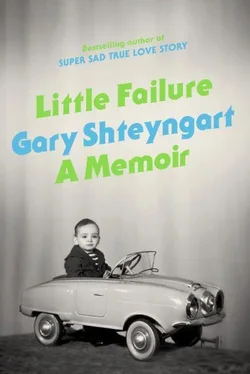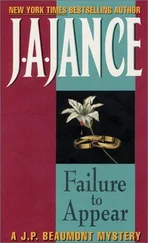“Really?” My mother cranes her neck. Her ability to be fascinated by things is her best gift to me. Each time I see her now, her hair is younger and spunkier, sometimes bobbed, sometimes teased, and her pretty face stands up to the sixty-seven years it has known with youthful bluster. She will not let go of life as easily as my father will.
“That’s Four Times Square,” I say, trying to deflect my father’s crooked stare. “The Condé Nast Building. The New Yorker’s offices are there, as well as many other magazines.”
“A ranking of New York writers came out on the Internet,” my father says. “You were ranked thirty, and David Remnick”— The New Yorker ’s editor—“was eight positions ahead of you. Philip Gourevitch”—one of the magazine’s brilliant staff writers—“was ranked number eleven. They are both ahead of you.”
“Semyon, stop,” my mother says.
“What?” my father says. “ Ya shuchu .” I am joking.
“ Shutki! ” he says, loudly. Jokes.
“No one understands your shutki ,” my mother says.
Aunt Tanya, ready to ingratiate herself with me, has her own opinion. “Yes, they say you will soon be forgotten, but many writers aren’t acknowledged until after their death.”
My father nods. His work here is almost finished. “And tell Remnick that if he doesn’t stop writing bad things about Israel, I will be forced to write a letter to The New Yorker .”
“Look,” I say, pointing at a skyscraper just coming into view. “That eagle! It’s Barclays Bank. Remember how our first bank checks in America had that eagle on them?”
My father’s gaze is upon me. Trying to gauge my reaction; trying to figure out what to say next.
Let me stop for a moment. What is it like to be him right now? What does he see through his brow-heavy stare? His son. A stranger. Ordering truffled things from the menu. With his Obama and his Remnick, the haters of Israel. My father has been to Israel for only seven days, but he loves it as obediently as anyone who doesn’t understand his young lover, who sees only her slinky dark shape, the curve of her settlements. In the third-floor attic where my father lives — the spacious second floor has long been surrendered to my mother — life is punctuated by the boom of the classical records and the drone of extremist rabbis on the radio. How did his son travel so far from there? Isn’t it his duty to stay by his father?
After each teardown, after each discussion of Internet rankings and blogs, after each barrage of insults presented as jokes, my father finishes with, “You should call me more.”
My son. How could he leave me?
I am looking down to see part of the floor moving around the restaurant’s core. A dullard at physics, I don’t understand how this works exactly: why this part of the floor is gently turning and the other part is perfectly still. I picture a team of sweaty, harnessed immigrant men in the basement of the Marriott making the skyborne restaurant revolve. “The soprano Galina Vishnevskaya has died,” my father says.
“Ah.”
“I went to the same musical school in Leningrad as her. They ruined her voice, and they ruined my voice, too. They made me a bass instead of a baritone.”
It’s about him now. About his opera career, the one he gave up to become, like most Soviet Jewish men, a mechanical engineer. It’s not about me. I breathe easily. At another recent dinner my father had put his arm around me, his face so close to mine that the whites and grays of his goatee nearly touched the grays of my stubble, and said: “I burn with a black envy [ chyornaya zavist’ ] toward you. I should have been an artist as well.”

The weekend after the Marriott dinner, I call them from the rural house where I spend half the year, trying to work. “The French Internet says your book is one of the best of the year!” they shout.
“They love you in France!” my father says.
I don’t want to hear anything about the Internet, bad or good, but suddenly we’re laughing. We’re talking about my father’s design work on what would become the world’s biggest telescope in 1975, a telescope that, like most Soviet products big and small, died on arrival. “Oh, how many Hero of Socialist Labor awards were given for that damn thing, and it didn’t work!” my father says. This is our little world, Soviet satire, failed empires, ridiculous dreams. I am filled with longing for them, for their company. I’m smiling and snug under the covers, the first dusting of December snow out my window, thick, clean country snow.
Down and up. Up and down. I am forgotten. I am remembered. I am number thirty. I am beloved in France. What is this? This is parenting. The parenting he knew, the parenting he gave. It is familiar and safe. Safe for some of us.
A few weeks before, at another family gathering, my father leans over the small woman who is now my wife and begins one of his “life on the farm” monologues. “When I was young, I kill sheep. Girls say, ‘No! Is so cute.’ But I slice, slice.” He makes a slicing motion across the imaginary animal’s throat. I lean into my wife, for support, although she is too strong to need it. “Then there is too much cat in village. So I take kitten and I drown. Drown, drown.” The dunking motions are articulated. “And then, of course, chicken comes and—”
Before the hen’s neck can be wrung, my wife and I look at each other with understanding. He is trying to assert himself. And to scare her. But beneath the blood of the martyred animals — for no good reason, I remember the Hebrew term for sacrifice, korban— lies a more prosaic truth. I am married now and even further apart from him. Someone else has come between us.
The Sheep Killer wants his son back.

“My first memory of when I was eight is that when I heard classical music, especially violin, I would cry sometimes,” my father says. “I would hide under the table and listen to the music and feel sad and cry. This is when I started to think about my father. I didn’t have memories because I didn’t really know him, but the sadness of not knowing him was tied in with the music. There was something about my father that I couldn’t remember. I started to buy records in a neighboring village, not a big assortment, but my first record was Caruso when he was singing his final aria from Tosca .” With a furrowed brow, with all the sadness and empathy he can muster, my father begins to sing in Russian: “Moi chas nastal … I vot ya umirayu!”
The hour is gone … And I, desperately, die!
There is a photograph of my father at fourteen or fifteen, dressed in a full tsarist general’s uniform and wig, his eyes ablaze with the peaceful sadness I don’t think I have ever found outside of a handful of Russian novels or after a volley of strong cocktails. He has been cast as Gremin in the school production of Tchaikovsky’s Eugene Onegin . It is a difficult part for a young bass, but my father is known around his small village as Paul Robeson, after the African American singer barnstorming across the Soviet Union with his “Ol’ Man River.” “In my school I was a celebrity,” my father says. “Almost like you now.”
In an alternate universe, Russia is a kind and sympathetic democracy, my father is the famous opera singer he wished to become, and I am his adoring son.

Back at the modest three-story colonial in Little Neck, Queens, the Thanksgiving dinner is winding down. I think of something my father had told me when I interviewed him last. He was speaking of the war, of being a tiny kid who had just lost both his father and his best friend, Lionya. “I fed a dog somewhere,” he said. “You shouldn’t write that because people were dying in Leningrad, but I remember how I fed a dog with a butter sandwich my mother had given me, which I guess means I wasn’t starving.”
Читать дальше













